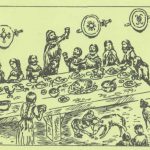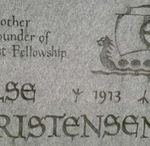Honor is better than Dishonor (1984)
by Stephen A. McNallen
from The Runestone Spring 1984 #47
Honor is one of those words we don’t see used much anymore. It’s a bit out of date, and to invoke it in conversation may bring cynical smiles and even a snicker or two. In recapturing the spiritual essence of Asatru, however, few concepts could be more important.
The Oxford Dictionary uses phrases like “nobleness of mind… allegiance to what is right… reputation” in defining honor. Let us look deeper.
In thinking about honor it soon becomes apparent that this is a virtue that sums up other virtues. It is honorable to be loyal. It is honorable to be truthful. All the character traits held in high esteem by our ancestors, when lumped together, constitute honorable behavior. When we do these things we are being honorable. From this it follows that there are many different roads we can and must travel to lead an honorable life, and that we have daily opportunities to train ourselves along these lines. Such molding of the personality is not easy because honor so often means placing spiritual considerations over money, personal advantage, and convenience. My dictionary tells me that honor is “allegiance… to conventional standards of conduct” which is only partially correct; in all too many instances the conventional standard of conduct involves lying, cheating and betrayal to kin. A life of honor often places us in direct opposition to the major trends in our society.
Among our ancestors, honor was given an importance which would seem almost fanciful to the cynical, jaded minds of our day. To impugn a person’s honor during the Viking Age might have meant battle to the death. Honor was worth life itself, and lasted after the body was a corpse in a tomb –
Cattle die, kinsmen die,
Every man is mortal:
But the good name never dies
Of one who has done well.
says the poet in the old Norse literature.
Honor is something we acquire by strict self-examination. Look at your actions at the end of the day – can you hold your conduct up to a mirror and say that your deeds have been honorable ones? If not, why not – and what can you do about it?
We can, bit by bit, strive for perfection in all matters of honor. When honor concerns mundane things easily within our control, this is hard enough but not impossible. Doing one’s duty in the daily course of things, speaking truly and forthrightly – these are important for us all and they add to the spiritual stature of ourselves and of those groups of which we are a part. In some matters, though, the price of honor in our society becomes desperately high.
Suppose your mother is robbed and beaten. You see the attack and chase the assailant down the street, throw him into an alley, and begin smashing his face against the sidewalk. Since you have just used “unreasonable force” beyond that needed to restrain the criminal, you will face assault charges. If you honorably resist arrest, you will be forcibly subdues or even shot by the arresting officers. Dishonorable laws made by dishonorable men forbid the exercise of honor. All of us who live in the modern nation-state make compromises because we don’t want to go to prison or die in a police shoot-out; to that extent we are all tainted by the corrupt system around us. Honor is no longer the simple thing it was a thousand years ago. The mugger, despicable as he is, is less threat to your honor than is the very structure of law and order that is allegedly on your side. Honor is no longer person on person or family on family; it is person or family against a system that most obviously includes the police and courts but actually includes the very fabric of modern life, from television and advertising to Christianity. So what do we do about such a dreadful dilemma?
Saga and epic show us that great men – stronger and bolder than most any of us – have used deception and guile against foe who outnumbered them greatly. The Havamal, purported to be the words of Odin himself, advises us that the use of trickery is acceptable. Do we say that the soldier who uses raid and ambush is a coward because he does not meet his enemy in orderly phalanx? Should Herman the Cherusci have fought Rome’s legions on flat terrain, forsaking the forested hills of the Teutoberger Wald?
No, the only disgrace lies in not fighting, in surrendering while life is left. We live in a debased society where perfect honor is impossible. Let us fight then – openly where we can, stealthy where we must, to replace this system, top to bottom, with one where honor can live.







